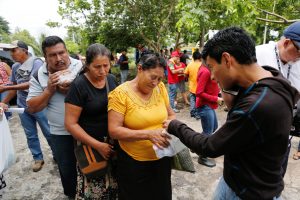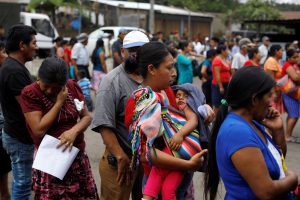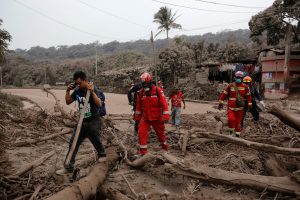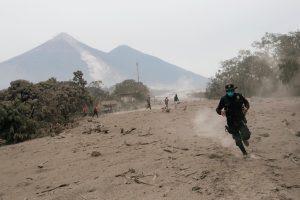
By Sofia Menchu
SAN MIGUEL LOS LOTES, Guatemala (Reuters) – Guatemalan officials warned of falling ash from the Fuego volcano late on Thursday and urged caution with flights as the Central American country recovers from devastating eruptions that have killed at least 109 people.
The seismological, volcanic and meteorological institute Insivumeh advised the civil aviation authority to take precautions with flights amid renewed activity from the peak, which produced a massive eruption on Sunday.

Relatives of victims of the eruption of the Fuego volcano receive food from volunteers outside the morgue of Escuintla, Guatemala 7 June, 2018. REUTERS/Luis Echeverria
The death toll from Fuego’s most violent eruption in four decades has been gradually rising and now stands at 109, the Guatemala’s disaster and forensic agency Inacif said earlier on Thursday.
Authorities have said a communication breakdown between CONRED and volcanologists in Guatemala delayed evacuations from the surrounding area.
Guatemala’s public prosecutor said on Thursday it would open an investigation into whether protocols were followed to inform proper decision-making in the handling of the disaster.
Rescue teams have been searching frantically for survivors and victims in the ravaged landscape, which is covered in ash and lava.
The eruptions have showered volcanic ash over a vast area and spewed deadly, fast-moving pyroclastic flows through nearby towns.
The U.S. government expressed its “deepest condolences” to the victims on Thursday and said it was sending emergency aid at Guatemala’s request, including an unspecified amount of financial resources to help with food, water, and sanitation.

Residents wait in line to receive aid at an area affected by the eruption of Fuego volcano at the village of Sangre de Cristo in Chimaltenango, Guatemala, June 7, 2018. REUTERS/Jose Cabezas
The White House said in a statement it was also dispatching aircraft to transport burn victims for treatment in Florida.
The International Federation of Red Cross and Red Crescent Societies (IFRC) raised concerns about the economic cost of the disaster in the poor country.
“We should not underestimate the scale of this disaster. Critical, emergency needs are still enormous, and affected communities will need sustained and long-term support,” IFRC President Francesco Rocca said in a statement on Thursday.
Rocca noted that ash had fallen across more than half of Guatemala, covering areas where agriculture is crucial.
“We hope it will not mean a secondary disaster,” he said.
The IFRC has pledged more than 250,000 Swiss francs ($253,000) to support rescue efforts and said those worst hit would need at least a year to recover.
The suspension of rescue efforts around the volcano may be lifted if conditions on the ground improve, CONRED said.
Volcan de Fuego, which means “Volcano of Fire” in Spanish, lies about 25 miles (40 km) southwest of the capital, Guatemala City.
(Reporting by Sofia Menchu; Editing by Rosalba O’Brien, Sandra Maler and Paul Tait)


